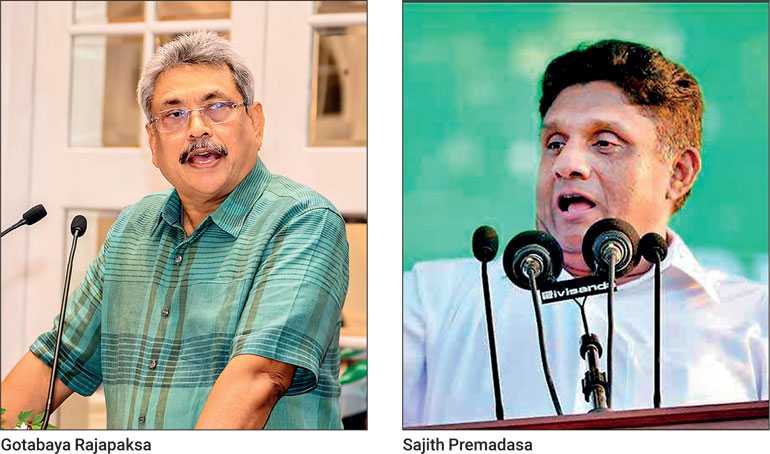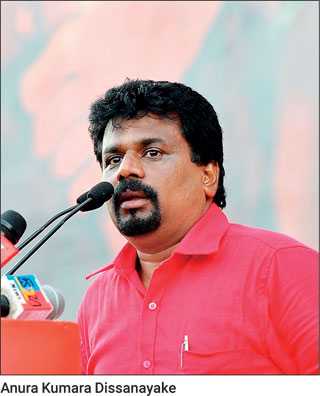Monday Feb 16, 2026
Monday Feb 16, 2026
Tuesday, 3 September 2019 00:00 - - {{hitsCtrl.values.hits}}

The last week has seen the public launching of two presidential campaigns. At each of these widely publicised and well-orchestrated meetings, the two potential candidates presented their manifestos.
One candidate, with the benefit of a teleprompter, read out a lengthy document which sounded much like a Speech from the Throne at an Opening of Parliament. The other candidate, in more strident tones, promised to implement an equally radical program of reform if he were elected to the office of President. The question that needs to be asked of both, and of other aspiring presidential candidates, is how they propose to implement their publicly proclaimed “policies”?

Can the next President implement his promised manifesto?
The Constitutional position today is that the Cabinet of Ministers is charged with the direction and control of the Government. It is the Cabinet that is collectively responsible and answerable to Parliament. While the President is a member of the Cabinet, and is described as being the Head of the Cabinet under Article 43(2), only a Member of Parliament may be appointed a Minister.
A transitional provision in the 19th Amendment enabled President Sirisena to assign to himself the Ministries of Defence, Mahaweli and Environment. That transitional provision ceases to operate when President Sirisena ceases to hold the office of President.
The next President will, therefore, not be entitled to assign to himself any Ministry, any subject or function of government. He may, if he wishes to, chair the meetings of the Cabinet, offer his opinion on Cabinet memoranda and even initiate a discussion on a subject close to his heart. What he cannot do is implement his “policy” in respect of any subject, since that would be to trespass on the territory of a duly-appointed Cabinet Minister to whom that subject has been assigned.
Can the next President assign himself the Defence portfolio?
Article 43(2) states quite explicitly that, on the advice of the Prime Minister, the President shall appoint Ministers from among the Members of Parliament. The next President, not being a Member of Parliament and not benefiting from the current transitional provision, cannot therefore hold any portfolio.
The fact that the President is entitled by virtue of his office to attend Parliament once in every three months, and is entitled to all the powers and privileges of a Member of Parliament when he does so except the right to vote, does not make him a Member of Parliament. In fact, Article 91 expressly states that the President is disqualified from being elected to Parliament.
It is argued that the preambular Article 4 states that “the executive power of the people, including the defence of Sri Lanka, shall be exercised by the President”. In the “defence of Sri Lanka”, the President may, under Article 33(2)(g) declare war and peace, but that is quite separate and distinct from being assigned the subjects and functions relating to defence or, for that matter, other executive powers relating to the administration of justice, health or foreign affairs.
Why is it then that, in full and complete knowledge of the purely ceremonial nature of the office of the next President, the major political parties are preparing to squander billions of rupees and put at risk the personal security of thousands of citizens in an island-wide election spread over a hundred days to choose the next President?
Prior to the 19th Amendment, the President was entitled to “assign to himself any subject or function and, for that purpose, determine the number of ministries in his charge”. That power was expressly repealed by the 19th Amendment.
It is also being argued that since the President is described in the Constitution as “the Head of State, Head of the Executive and of the Government, and the Commander-in-Chief of the Armed Forces”, he should necessarily be the Minister of Defence. Incidentally, under the 1972 Constitution, President Gopallawa was also described as “Head of State, Head of the Executive, and Commander-in-Chief of the Armed Forces”. These high-sounding titles do not bring with them any special powers. The Commander-in-Chief is not a uniformed officer. In parliamentary democracies, the principle of civilian control of the military is established through the designation of the Head of State as Commander-in-Chief as well. In the United Kingdom, the Queen is the Commander-in-Chief, and she has never made any claim through that title to be appointed Minister of Defence.
Can the next President change the ‘composition’ of the Cabinet?
Under the 19th Amendment, the President can appoint and remove Ministers and Deputy Ministers only on the advice of the Prime Minister.
The power he previously enjoyed of removing the Prime Minister from office has also been repealed. It is being argued by some that Article 43(3) enables the President at any time to “change the assignment of subjects and functions and the composition of the Cabinet of Ministers”.
That provision is immediately qualified by Article 46(3) which states that a Minister or a Deputy Minister may be removed from office under the hand of the President only “on the advice of the Prime Minister”.
The next President will, therefore, not be entitled to assign to himself any Ministry, any subject or function of government. He may, if he wishes to, chair the meetings of the Cabinet, offer his opinion on Cabinet memoranda and even initiate a discussion on a subject close to his heart. What he cannot do is implement his “policy” in respect of any subject, since that would be to trespass on the territory of a duly-appointed Cabinet Minister to whom that subject has been assigned
Article 43(2) also qualifies the President’s power under Article 43(3) to “change the assignment of subjects and functions”. For example, the removal of the subject of higher education from one Minister and its transfer to another will constitute, in effect, the removal of the Minister of Higher Education, which the President cannot do except on the advice of the Prime Minister. In any event, whoever is elected President in November will need to “co-habit” with the current Prime Minister and his Cabinet of Ministers until the next general election since the Constitution does not provide for the dissolution of the Cabinet following a presidential election.
Can the mode of election of the President be changed without a referendum?
Article 30(2) states that “The President of the Republic shall be elected by the People and shall hold office for a term of five years.”
Article 83 states that a Bill for the amendment or for the repeal and replacement of, or which is inconsistent with, the provisions of paragraph (2) of Article 30 “which would extend the term of office of the President” shall become law only if it is also approved by the people at a referendum.
Therefore, it is only a Bill that seeks to extend the term of office of the President that requires approval by the people at a referendum. A Bill to change the mode of election of the President is only required to be passed with a two-third majority in Parliament.
Conclusion
Why is it then that, in full and complete knowledge of the purely ceremonial nature of the office of the next President, the major political parties are preparing to squander billions of rupees and put at risk the personal security of thousands of citizens in an island-wide election spread over a hundred days to choose the next President?
Why does Parliament not legislate, even at this very late stage, following the practice of many other democratic countries including our neighbour India, to provide for the election either through Parliament or by a democratically-constituted Electoral College of a nationally-respected person of knowledge, experience and integrity to the non-political office of President of the Republic? Why does the UPFA which, when in government in 2000 introduced a draft constitution in which the President was to be elected by Parliament, now remain silent? Why is it that the present UNF Government whose draft Constitution provides for the President to be elected by the proposed two Houses of Parliament, now remain silent? Even the JVP appears to be unwilling to present a revised version of its own draft 20th Amendment which provides for the next President to be elected by Parliament.
Do our political leaders not realise that a President elected by the people at a national election, though devoid of power, will surely claim greater legitimacy over a Prime Minister chosen by Parliament, and may well establish a parallel centre of power and make a mockery of parliamentary executive government? Does no one realise that we could well have a President belonging to one party and a Prime Minister belonging to a different party, and a repetition of the shambolic relationship that now prevails between the Prime Minister and the President, the pantomime that we have been subjected to in the name of “Yahapalana”?
Why are civil society, professional bodies and political columnists remaining silent on this issue? Why is everyone reconciled to the fact, the unfortunate fact, that through mountains of garbage and corruption at every level, in every institution, in politics, business and in the legal sphere, we are now sleepwalking into anarchy?